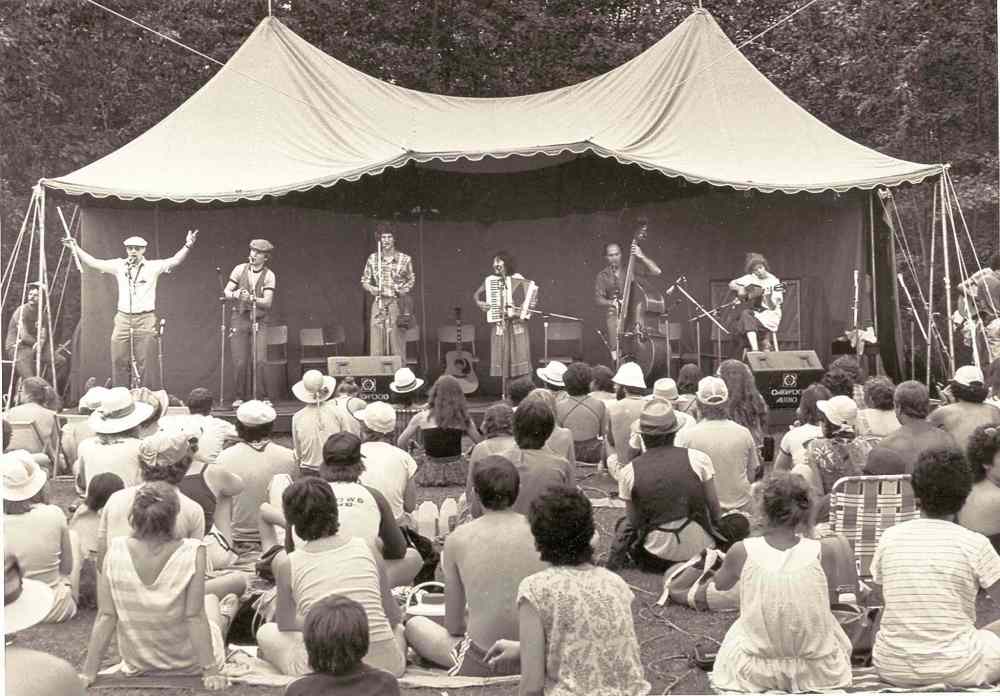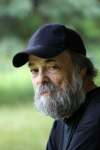The first Folk Fest
Event was pitched as a centennial celebration
Advertisement
Read this article for free:
or
Already have an account? Log in here »
To continue reading, please subscribe:
Monthly Digital Subscription
$19 $0 for the first 4 weeks*
- Enjoy unlimited reading on winnipegfreepress.com
- Read the E-Edition, our digital replica newspaper
- Access News Break, our award-winning app
- Play interactive puzzles
*No charge for four weeks then billed as $19 plus GST every four weeks. Offer only available to new and qualified returning subscribers. Cancel any time.
Read unlimited articles for free today:
or
Already have an account? Log in here »
Hey there, time traveller!
This article was published 05/07/2014 (3828 days ago), so information in it may no longer be current.
This Wednesday, the 41st Winnipeg Folk Festival kicks off at Birds Hill Park with a mainstage show headlined by legendary blues artist Bonnie Raitt.
The multi-day outdoor festival has become one of Canada’s premier summer events, drawing fans from across the continent. But if founding father, guru and visionary Mitch Podolak had listened to me, the Winnipeg Folk Festival might never have come to be.
In early 1973, I was living in the third-floor attic suite of a funky old house at the corner of Gertrude Avenue and Daly Street in Fort Rouge, playing in rock bands and attending university. CBC documentary filmmaker, banjo picker and avowed Trotskyite Mitch Podolak, along with wife Ava Kobrinsky, occupied the more spacious main-floor suite. Podolak must have seen me carting my guitar case up and down the stairs, because one day he stopped me in the stairwell.

“What do you think about a folk festival for Winnipeg?” he asked. A folk festival? I was a die-hard rock ‘n’ roller. “Nah, it’ll never fly.”
Thank goodness Podolak chose to ignore my dismissive response and proceeded to make his dream a reality.
“The inspiration for the festival happened in that house,” he says. “There was an ad on TV about Winnipeg’s centennial in 1974.”
Under the guise of a centennial project, Podolak and partner Colin Gorrie managed to scrape together $77,000 from various governments to stage the Winnipeg Centennial Folksong Festival. “I never thought of it as a one-off event just for the centennial year,” he admits. “I always had a longer-term vision.”
Podolak and Gorrie made quite the odd couple. “Here I was, a 24-year-old hippie,” notes Podolak, “and Colin was this very British gentleman, an architect, sporting an ascot.”
“Mitch thought that my English accent would help raise funds and give the Folk Festival idea some respectability,” Gorrie says. “The only folk festival in Canada at the time was Mariposa (north of Toronto). All anyone knew of music festivals was Woodstock. We were terrified that people would assume our festival would be an excuse for raising hell. But we got the money.”
Their initial choice of site — La Barriere Park, south of the city — proved impractical for the volume of vehicular traffic anticipated, so the two looked north.
“Birds Hill Park was brand new,” recalls Podolak, “and we were fortunate to get it. Being an architect, Colin designed the original site. He went around carrying a stick with a hole in it, taking soil samples to select the perfect spot for the mainstage. We built everything at the Transcona rail yards, and lot of the original crew came from there — rail workers and guitar players.”
“Mitch is definitely the key to it all,” says friend Peter Feniak, “but he had lots of help and positive support, without which there would be no Winnipeg Folk Festival. People like Rick and Rosie Neufeld were huge contributors. Rosie launched the Hand-Made Village. Rick was a leader. He and Jim and Dan Donahue, Len Udow, Graham Shaw, Cathy Fink and Duck Donald, and a very young Loreena McKennitt made up the early Manitoba music contingent.”
For Podolak, it was essential the festival be true to the traditions of folk music and have a political undercurrent.
“Folk music is working-class culture,” he insists. “It’s a living art form, the people’s music, and that’s really the whole point about starting the festival in the first place. I did this with the idea of spreading socialist ideas through music, just like Pete Seeger and Woody Guthrie, who are still my heroes.”
Forty-two acts were booked for the three-day event, which started Aug. 9, with former Winnipegger Oscar Brand serving as host. Admission was free. The one-and-a-half-metre-high mainstage was located at the bottom of a natural amphitheatre, with the audience less than three metres from the performers, creating a sense of intimacy. Workshop stages were scattered throughout the site, furthering the informal and intimate experience.
Getting word out about the festival, however, required some deception.
“Colin and I did a smart thing,” laughs Podolak. “We initiated a rumour that Bruce Cockburn was playing for free in Birds Hill Park at a folk festival. No one knew what a folk festival was, but they came to see Bruce. So I kind of credit him for helping kick-start the whole thing.”
In the end, some 22,000 people attended, turning a long shot into a home run.
The key to the original festival and every festival since has been the army of volunteers who assume whatever responsibilities are assigned to them. As longtime volunteer John Prentice points out, “I guess the early positive memory I have was meeting and hearing Mitch Podolak. It impressed me how he motivated the volunteers in small groups before the festival each year. By making sure he spoke clearly, he inspired us about the festival, as to what it was and what our collective purpose was.”
Recalls Marnie Hocken, “That first year I volunteered in the first-aid trailer. There were a lot of injured camping partiers. I remember one guy cut off his toes chopping wood. He was oblivious and was still having a good time while waiting for an ambulance. I had to send his friends back to the campsite to look for his toes in case it was possible to sew them back on. Crazy times! If you were hot, you could just walk over a little hill and go swimming at the beach.”
The mosquitoes were a formidable challenge that first year.
“Mitch always made sure the artists had first-rate treatment,” notes Feniak, “but the first year, the big barbecue happened in the woods at Birds Hill. It was great for privacy and camaraderie, but mosquitoes love barbecued steaks, too, and they swarmed. Bruce Cockburn, Peter Gzowski, John Allan Cameron et al were fighting them off.”
Nonetheless, Podolak’s dream endured and despite some lean years financially, it continues to entertain and inspire. Over the decades, the roster of performers has broadened beyond folk music to encompass a more eclectic (and electric) world music vision.
“The Winnipeg Folk Festival opened doors to the rest of Canada, if not into the States as well,” notes performer Heather Bishop. “It’s still very relevant.”
Muses Podolak’s son and founder of bluegrass band the Duhks, Leonard Podolak, “People go to the festival and their world gets transformed. I can’t really think of any folk musicians who would be playing that kind of music if it weren’t for the Folk Festival. Where would they get exposure to that kind of music or get to play or find like-minded people? I think the folk festival has been a huge catalyst for so many people.”
Though he has since moved on to other music endeavours, Mitch Podolak remains proud of what he created. “There is a whole generation of musicians, a couple of generations in fact, who were entirely inspired by the Winnipeg Folk Festival.”
Sign up for John Einarson’s Magical Music History Tour of Winnipeg at heartlandtravel.ca.

John Einarson
Born and raised in Winnipeg, music historian John Einarson is an acclaimed musicologist, broadcaster, educator, and author of 14 music biographies published worldwide.
Our newsroom depends on a growing audience of readers to power our journalism. If you are not a paid reader, please consider becoming a subscriber.
Our newsroom depends on its audience of readers to power our journalism. Thank you for your support.
History
Updated on Sunday, July 6, 2014 12:32 PM CDT: Fixes to say Ava Kobrinsky.



